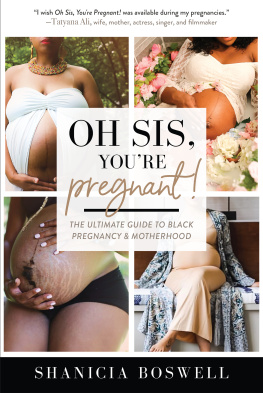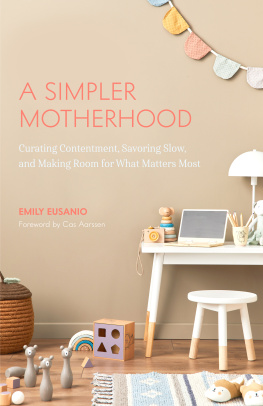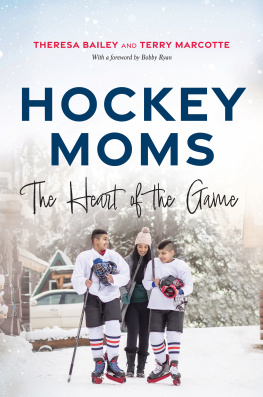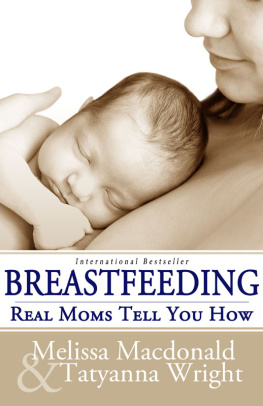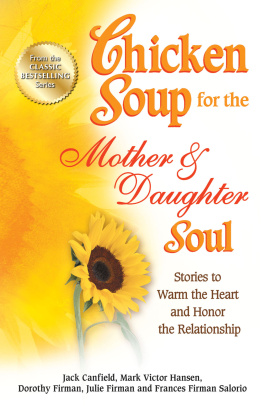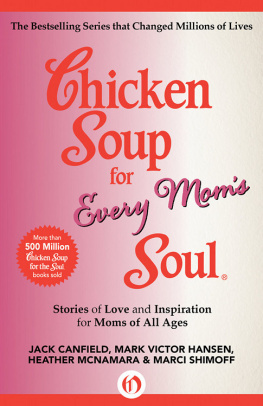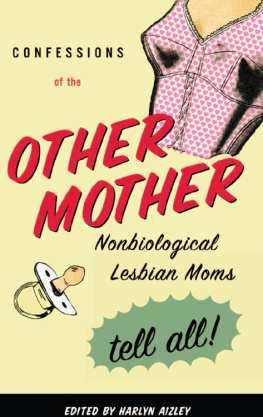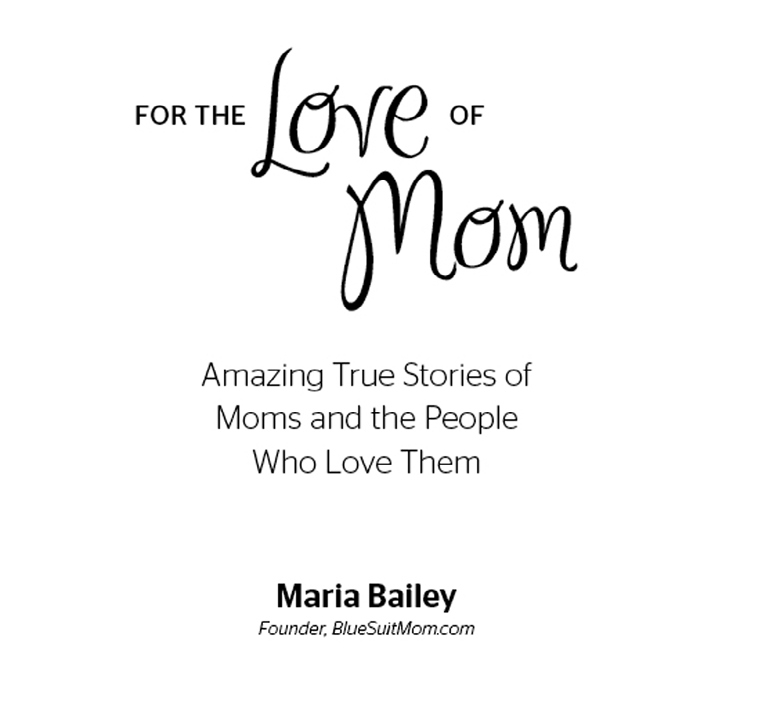

Health Communications, Inc.
HCI Books, the Life Issues Publisher
Deerfield Beach, Florida
www.hcibooks.com
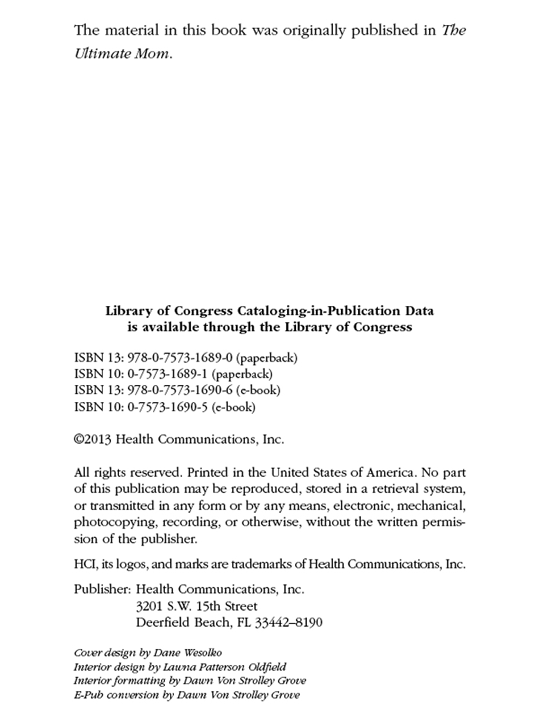
To the four wonderful people
who call me Mom:
Madison, Owen, Keenan, and Morgan.
Contents
Tracy Line
Andrea Marcusa
Connie K. Pombo
Mimi Greenwood Knight
Marilyn Nutter
Joyce Stark
Rachel Wallace-Oberle
Jane Koenen Bretl
Gabrielle F. Descoteaux as told to John J. Lesjack
Terri Elders
Colleen Ferris Holz
Tina Koenig
Cookie Curci
Ryma Shohami
Jill Sunshine
Connie K. Pombo
Michelle L. Miller
Ferida Wolff
Judy Wilson as told to Peggy Frezon
Emily Parke Chase
Jean Fogle
Louis A. Hill Jr.
Judy L. Adourian
Maria Bailey
D. B. Zane
Georgia A. Hubley
Michael Jordan Segal
Sallie A. Rodman
Joyce Stark
Annmarie B. Tait
Judi Moreo
Marcia E. Brown
Connie K. Pombo
Amy Mullis
Sandy Foster Brooks
Linda Kaullen Perkins
Minnie Browne
Helen Colella
Linda OConnell
Patricia Hoyt
Cynthia Thrift
Ava Pennington
Ellen Javernick
Jacqueline Seewald
Terri Elders
B. J. Bateman
Roberta McGovern
John J. Lesjack
Kathe Campbell
Marilyn A. Gelman
Wayne Scheer
Nancy Viau
Todd Outcalt
or What It Really Means to Be a Mom
M otherhood. There are few words in the English language that hold so much meaning and even fewer that are so undefined. As a noun, its an identity that is customized by the women who possess it, and as a destination, its a role entered into in many different ways. Its a life stage that even girls as young as two years old strive to obtain. We see it in the faces of ponytailed toddlers when they hold their baby dolls close to their breast and rock them gently, singing the lyrics to their favorite lullaby. As teenagers, hormonal mothers-to-be practice their skills for motherhood by babysitting. The desire to obtain the state of motherhood is so strong in some women that it triggers an internal clock that some tie to biology, but in reality it is the innate need to nurture and love unconditionally.
Entering the world of motherhood can come in many different ways. Four million women a year give birth to babies in the United States, while more than 250,000 adopt children from within the country or beyond our borders. Others marry into the role of motherhood, committing to nurture children from another marriage or foster little people who yearn for the warmth of a mothers love.
Sometimes a woman takes on the role of Mom without sharing biology or even the same home. There are plenty of aunts, friends, and caretakers who could just as fully be called Mom.
Once we enter into motherhood, the names we choose to identify our newly acquired state of mutual dependency are as numerous as the journey that takes us there: Mother, Mom, Madre, Mama, and Mommy. However, its not only the name we respond to that joins us to our children but the voice that projects it. Mothers come with a sixth sense that allows them to identify with the right mom, even when its hollered in the middle of a crowded mall. Regardless of the number of other moms in the same space, we seem to know that its our child whos in need.

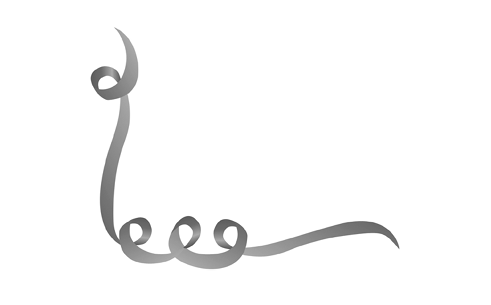
By Tracy Line
I t took me a long time to figure out I was a mother. Oh, I knew I had kids (how could I forget?), but me, a mother? I was more like a woman with children. You see, in my mind, a mother was so much more than I could ever be.
Ill never forget the day I discovered I was pregnant. Staring at that little white stick with the blue line, I wonderedhow could it be? I didnt feel any different; I didnt look any different, but, suddenly, I was different. I remember pondering, What kind of mother will I be? I thought I would soon know, but I was wrong.
Nine months later, I lay in my hospital bed, staring at our little pink bundle with awe (or perhaps it was fear). I knew nothing about this little person whom I held in my arms except that it was my job to raise her. I do remember the nurse telling my husband what a nice family we had. Family? We werent a family . A family is two kids, a dog, and a mortgage, along with a mother who knew what she was doing. Others may have defined us as a family, but in my book we were just us, plus her.
We took our baby home and life went on. My husband and I did what all young parents do; we fumbled. We naively made our way through colic and midnight feedings and spit-up. That first year was full of ups and downs. I felt such joy and love for my girl, yet I was also overwhelmed from the responsibilities of being a working mother. My husband was there to help, but, even so, I felt completely alone in my passage to motherhood. The roles of Helper and One-in-Charge were clearly established. I was the one responsible for soothing her cries, rocking her to sleep, teaching her how to share; he would help.
The problem was I didnt always know how to do these things. Sometimes I couldnt get my girl to stop crying or settle down to sleep, and she didnt always share. It seemed there was a disconnection. I often watched other mothers in action and wondered how they did it. How come they had everything they needed in the diaper bag while I left mine at home? How did they get their toddler to stop running through the mall, while mine just laughed and ran faster? The first years of motherhood left me feeling inadequate. A real mother would know what to do; for me, it was hit or miss all the way.
One thing I did have down was the guilt. Id heard other mothers say they couldnt bear to leave their children. Me? I longed to sleep through the night or eat a meal without interruption. No one else seemed to want that. Real mothers, I thought, arent so selfish. They care for their babies with love and patience. I did, too, but I didnt feel like it. Not that I didnt love my girl; I did. I just found that being a mother could be hard; it requires giving up what you want to do for what is best for your child. Was I the only one who noticed that?
So what was a real mother in my book? Everything I wasnt. Real mothers were calm and confident, much more sure of themselves than I was. They knew how to handle the unfathomable situations children put you in. Real mothers had pot roast in the oven and a house that smelled of clean laundry. They were prepared: toys and snacks in the diaper bag, tissues and wipes in the van. I had a ten-year-old sedan and a diaper bag with stale crackers and an empty tube of Desitin. Real mothers, not wannabes like me, had the knowledge, confidence, and supplies. I wasnt in their league.
Maybe, I thought, I could learn to be one of those mothers. I turned to the experts and read book after book after book. But instead of answers, all I got was confusion. Oh, there was plenty of advice out there; the trouble was that it was all paradoxical. If I wanted to discipline my child, I should be loving and firm, but not harsh. I should be consistent yet flexible, but maintain a solid routine. No one had advice for how to fit in a shower, convince a thirteen-month-old to get dressed, or keep her away from the dog food bowl. The books werent helping.


